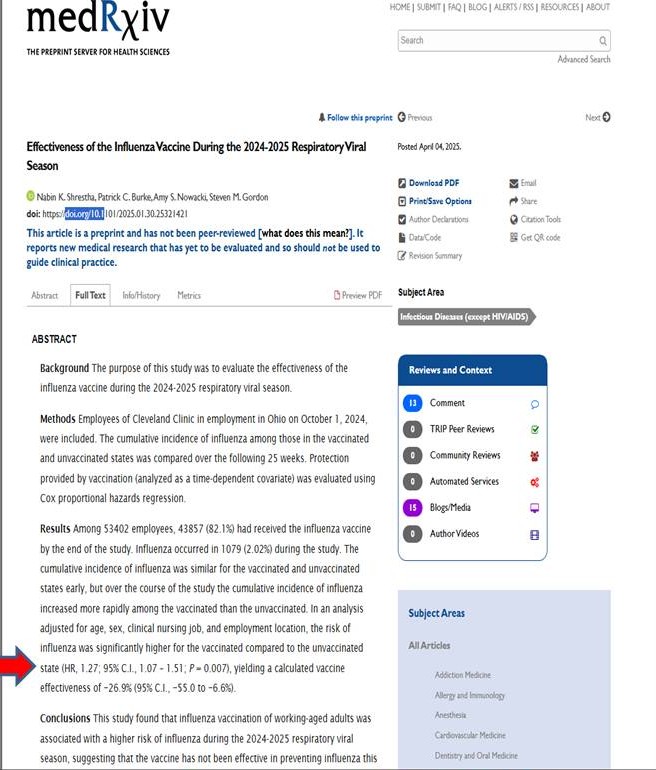"Uncover the truth behind the groundbreaking discovery of the causes of the world's biggest problems. 'The Root Causes' will change how you view the world!"
Understanding the Role of Potassium Chloride in Vaccine Formulations
Potassium chloride (KCl) is used in vaccines as a stabilizer at concentrations ranging from 0.5 to 4.0 mM, which is within the physiological extracellular potassium range of 3.5–5.0 mM. Although these doses are tiny compared to lethal injection doses, studies show that elevated extracellular potassium can inhibit B cell receptor signaling, reduce calcium influx, and decrease NF-κB activation, potentially lowering antibody production. This mechanism provides a plausible explanation for observations such as the 27% increased risk of influenza infection among some vaccinated populations. While KCl in vaccines is generally considered safe, the ionic environment may transiently modulate immune responses in certain individuals. Further research is needed to fully understand how vaccine stabilizers influence B cell function and overall vaccine efficacy. 30 Hashtags #PotassiumChloride #KCl #VaccineStabilizer #ExtracellularPotassium #BCells #AntibodyProduction #ImmuneResponse #NFkB #CalciumInflux #ImmuneModulation #
Glenn Rosaroso Vale, MT(AMT), MS(IT), MBA
10/10/20253 min read


Can Potassium Chloride in Vaccines Affect Antibody Production?
Introduction
Interestingly, potassium chloride (KCl) is also one of the agents used in lethal injection protocols for death row individuals, where high doses rapidly disrupt cardiac function. This illustrates that KCl’s effects are highly dose-dependent. In vaccines, however, KCl is used in tiny amounts as a stabilizer.
Vaccines are essential tools in preventing infectious diseases, and their stability is crucial for efficacy. Potassium chloride (KCl) is commonly included in vaccine formulations for this purpose. However, concerns have been raised about the potential impact of KCl on immune cell function, particularly B cells, which are responsible for producing antibodies.
This article explores normal extracellular potassium levels, the concentrations of KCl used in vaccines, and examines scientific studies to determine if KCl levels in vaccines could influence antibody production. Moreover, this physiologic explanation could plausibly contribute to observations such as the 27% increased risk of influenza infection in some people vaccinated with certain flu vaccines, as reported in large population studies.
Normal Extracellular Potassium Levels
In the human body, potassium is predominantly an intracellular ion, with approximately 98% of total body potassium located inside cells. The remaining 2% is distributed in the extracellular fluid, including plasma. The normal extracellular potassium concentration ranges from 3.5 to 5.0 millimolar (mM). This concentration is tightly regulated, as deviations can lead to significant physiological consequences.
Potassium Chloride in Vaccines
To maintain the stability of vaccines, KCl is often added. The concentration used in vaccines typically ranges from 0.5 to 4.0 mM. This amount is intended to stabilize the vaccine without significantly altering the ionic balance of the extracellular fluid.
Potential Impact on B Cells and Antibody Production
B cells are a type of white blood cell that play a pivotal role in the immune response by producing antibodies. The activation of B cells involves complex signaling pathways that are influenced by the ionic environment, including extracellular potassium levels.
A study published in Immunology in 1999 investigated the effects of elevated extracellular potassium on B cell activation. The researchers found that increased extracellular potassium concentrations inhibited B cell receptor (BCR) signaling, leading to reduced B cell proliferation and antibody production. Specifically, they observed that elevated K⁺ levels decreased calcium influx and NF-κB activation, both crucial for B cell activation and function.
While this study did not focus exclusively on the 0.5–4.0 mM range, it provides evidence that increased extracellular K⁺ concentrations can impair B cell function. Given that extracellular K⁺ concentrations in the body are typically around 3.5–5.0 mM, the 0.5–4.0 mM range is within the physiological range and could potentially influence B cell activity. This mechanism could plausibly help explain why some studies have observed a 27% increase in influenza infection among vaccinated individuals, suggesting that slight modulation of extracellular potassium by vaccine stabilizers may transiently reduce antibody production in certain populations.
Conclusion
While the concentrations of KCl used in vaccines are designed to stabilize the formulation without adversely affecting immune function, scientific studies suggest that elevated extracellular potassium levels can impair B cell activation and antibody production. Therefore, it is essential to carefully consider the ionic composition of vaccine stabilizers to ensure they do not negatively impact immune cell function. Further research is needed to fully understand the implications of KCl concentrations in vaccines on immune responses and how this may relate to observed differences in vaccine effectiveness.
References
Mahtani, T. (2019). Beyond the CRAC: Diversification of ion signaling in B cells. Immunology. Retrieved from https://pmc.ncbi.nlm.nih.gov/articles/PMC6851625/
Owens, T. (1982). T-dependent B-cell activation is signalled by an early increase in potassium uptake. Cellular Immunology. Retrieved from https://www.sciencedirect.com/science/article/pii/S0171298511800070
Arlehamn, C. S. L. (2010). The role of potassium in inflammasome activation by potassium efflux. Nature Reviews Immunology. Retrieved from https://pmc.ncbi.nlm.nih.gov/articles/PMC2856258/
Health
Understanding illness to empower your well-being journey.
Wellness
Knowledge
info@rootcauseprevention.com
903-268-6664
© 2024. All rights reserved.
grfv@sbcgloal.net